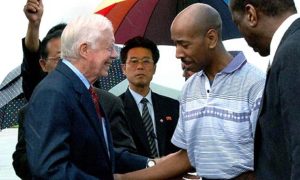How do you pick an envoy for a “rescue” mission to North Korea? Foreign Policy’s Josh Rogin looked at how this question was answered in the most recent case involving former President Jimmy Carter’s mission to Pyongyang to retrieve American citizen Aijalon Mahli Gomes. It’s a good piece that also details the insider campaigns waged by former Ambassador to the UN Bill Richardson and Senate Foreign Relations Committee Chairman John Kerry to win the assignment.

Carter and Gomes (Credit: The Guardian)
In a recent post, I provided an assessment of what motivates the Kim Family Regime (KFR) to be such a bad neighbor. Briefly, by acting out, the regime is trying to manipulate the security environment for a variety of reasons, the most important of which for our purposes here is to create something it can trade (the prospect of better behavior) for aid or, more likely, an easing of tensions and/or sanctions. It’s a bizarre sort of circular argument, but it works for Kim and keeps his enemies off-balance.
It is possible to understand Gomes’ release in this light: tensions between North Korea and the South Korea-U.S. duo are very high right now; by agreeing to the release, the KFR was sending a message that it is still in the deal-making business, which keeps the door open for diplomacy. However, even though the KFR was signaling its intention to release Gomes, the U.S. could have mishandled the pickup.
One of the main things the U.S. government has to be very careful to avoid in these types of situations is an attempt by the captors to link the fate of political prisoners linked to more difficult bilateral issues. The logic that forbids negotiating with terrorists applies here: if the U.S. started trading things for imprisoned citizens, more citizens would likely be imprisoned by foreign governments. The U.S. does not want prisoners to be used as bargaining chips – it would increase the cost to the U.S. of achieving its policy goals, and the prisoners could end up imprisoned much longer if their cases become tied to intractable debates.
What makes the selection of an ex-president so strong in these situations is that he can gain a high-level audience and offer sincere apologies for his countryman’s transgressions without speaking for the U.S. government or being pressed to trade something for his release. Both Clinton and Carter were free to offer apologies to the North Koreans – speaking only on their own authority and on their own behalf – and in both cases the U.S. and North Korea walked away with an ability to claim victory for their respective sides without having to concede anything they really valued.
The Clinton and Carter missions were hardly major diplomatic triumphs; they simply needed to stay on message and avoid those sorts of wider debates. Rogin and others have noted that this made Carter a bit of a risky pick, as he has become something of a diplomatic loose cannon. In the event, Carter never met Kim, who snubbed Carter by setting off for China with his son just as Carter was arriving. One more reason there to pick a civilian: it is a much smaller deal if a private citizen is stood up by a mercurial dictator than if the same happens to an officer of the government.